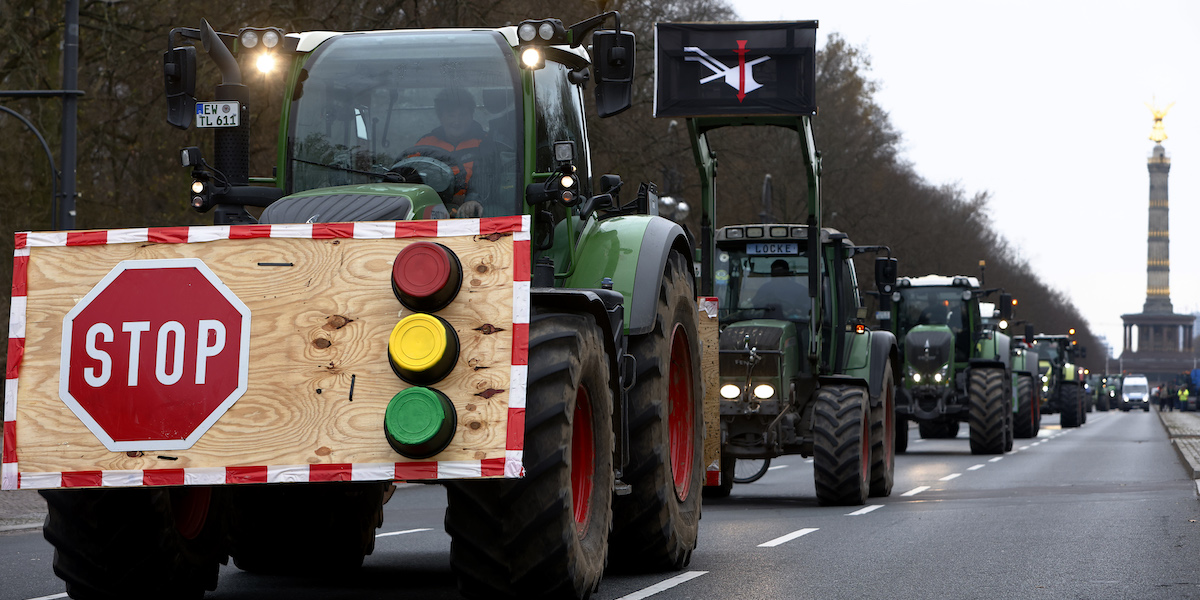Loading player
A widespread protest by farmers and ranchers began in Germany on Monday, blocking access to roads and highways in various German cities. The protest will continue until the end of the week but is by no means isolated: in recent months similar protests have been held, albeit for different specific reasons each time, in various European countries including France, NetherlandsPoland, Spain, in the UK e in Serbia. Several European newspapers saw us a trend: a few months ago on Financial Times had written that now in various countries “farmers are challenging the green agenda of the European Union”.
A first general explanation of the protests actually concerns the European Union. In recent years the European Commission led by Ursula von der Leyen has spent much of its political capital to approve the European Green Deal, a series of measures to make energy production and the style of life of European citizens. Despite much resistance from the sector, the European Green Deal was largely approved and among other things binds the countries of the European Union to reduce net emissions by 55 percent by 2030 and to eliminate them by 2050. To achieve these objectives, various measures are needed at European and national level, which will partly affect the lives of European farmers.
The agriculture and livestock sector is historically one of the most widespread in European countries, and even today, despite a progressive emptying of internal areas and countryside, it employs millions of people. Second the latest data availablewithin the European Union there are approximately 9.1 million farms and agricultural businesses, and 38 percent of the territory is cultivated or used for pasture.
A large part of European farms and agricultural businesses are able to sustain themselves thanks to agricultural funds, which still today represent around a third of the European Union’s multi-annual budget. For the budget in force between 2021 and 2027, the European Union will spend approximately 387 billion euros on its Common Agricultural Policy (also called CAP), i.e. the main instrument through which it distributes its funds. That is, a figure comparable to the GDP of Denmark.
Around 95 percent of European farms or agricultural businesses are family-run and have an often very limited economic margin, also due to the ever-increasing frequency of extreme events caused by climate change and the general increase in energy costs. No European politician questions that European agriculture should be subsidized in some form. At the same time, however, agriculture is one of the sectors that so far they reduced less its own polluting emissions, compared for example to energy production and more generally to the industrial sector.
The funds linked to the CAP have therefore been linked to a series of objectives that will force farmers almost everywhere to make their production more sustainable: for example the plan Farm to Fork plans to convert at least 25 percent of cultivated land to organic farming by 2030, while a proposal to drastically reduce the use of pesticides is still under discussion in the European Parliament, again by 2030 (an initial proposal to reduce them by 50 percent hundred was rejected after much pressure from trade associations).
– Read also: What stage is the European Green Deal at?
Several national governments are also imposing more stringent measures to reduce emissions from agricultural companies: both because they are bound by the Green Deal and because in several countries sensitivity to the ecological transition has increased significantly in recent years. At the same time, however, the proposals for ambitious measures were followed by strong protests.
The German government for example, in which the Greens are the second most represented party, recently announced a progressive reduction in subsidies for the purchase of diesel: it was this announcement that caused the protest of recent days. In France, during the first years of government, Emmanuel Macron had tried to introduce more stringent limits on the use of pesticides, after presenting himself with a rather ambitious program on environmental sustainability. After years of protests, however, in March the French government he left the idea of setting a precise reduction target by 2030. French farmers continue to perceive the government as distant from their needs, and at the end of December they overturned hundreds of road signs in protest.
France turned upside down: farmers’ protest with road signs pic.twitter.com/g2OJ0OT9mv
— Voice of Europe 🌍 (@V_of_Europe) December 14, 2023
In various European countries, just like in Italy, trade associations are very organized and can move large quantities of votes.
For months at a national level, several far-right parties have been aligning themselves with the farmers’ demands in the hope of attracting votes and sympathy. Since last year the European People’s Party (EPP), the main European centre-right party, has imagined the upcoming electoral campaign for the European elections as a series of messages of support to the inhabitants of the internal areas, including farmers. The vote on the 50 percent reduction in pesticides in the European Parliament was rejected mainly due to the opposition of the EPP, which is nominally part of the majority managing the work.
«We cannot be surprised that farmers and breeders have returned to the center of public debate, given the pressure on agricultural companies and the fact that the sector still plays a very important role in the policies of various member countries of the Union», he said a Euractive Fabian Zuleeg, head of the European Policy Center think tank: «populists do not have better answers than others to farmers’ problems, but they will still try to exploit their condition in the electoral campaign for the European elections».
